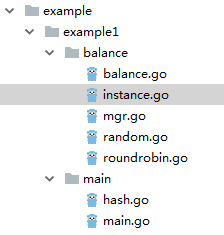代码记录
程序结构目录

--------程序包

package balance type Balancer interface { DoBalance([]*Instance, ...string) (*Instance, error) }

package balance import ( "strconv" ) type Instance struct { host string port int } func NewInstance(host string, port int) *Instance { return &Instance{ host: host, port: port, } } //定义Instance结构体的方法GetHost() func (p *Instance) GetHost() string { return p.host } //定义方法GetPort() func (p *Instance) GetPort() int { return p.port } func (p *Instance) String() string { return p.host + ":" + strconv.Itoa(p.port) }

package balance import "fmt" type BalanceMgr struct { allBalancer map[string]Balancer } var mgr = BalanceMgr{ allBalancer: make(map[string]Balancer), } func (p *BalanceMgr) registerBalancer(name string, b Balancer) { p.allBalancer[name] = b } func RegisterBalancer(name string, b Balancer) { mgr.registerBalancer(name, b) } func DoBalance(name string, insts []*Instance) (inst *Instance, err error) { balancer, ok := mgr.allBalancer[name] if !ok { err = fmt.Errorf("Not found %s balancer", name) return } fmt.Printf("use %s balancer ", name) inst, err = balancer.DoBalance(insts) return }

package balance import ( "errors" "math/rand" ) func init() { RegisterBalancer("random", &RandomBalance{}) } type RandomBalance struct { } func (p *RandomBalance) DoBalance(insts []*Instance, key ...string) (inst *Instance, err error) { if len(insts) == 0 { err = errors.New("No instance") return } lens := len(insts) index := rand.Intn(lens) inst = insts[index] return }

package balance import ( "errors" ) func init() { RegisterBalancer("roundrobin", &RoundRobinBalance{}) } type RoundRobinBalance struct { curIndex int } func (p *RoundRobinBalance) DoBalance(insts []*Instance, key ...string) (inst *Instance, err error) { if len(insts) == 0 { err = errors.New("No instance") return } lens := len(insts) if p.curIndex >= lens { p.curIndex = 0 } inst = insts[p.curIndex] p.curIndex = (p.curIndex + 1) % lens return }
------入口

package main import ( "fmt" "go_dev/day7/example/example1/balance" "math/rand" "os" "time" ) func main() { var insts []*balance.Instance for i := 0; i < 16; i++ { host := fmt.Sprintf("192.168.%d.%d", rand.Intn(255), rand.Intn(255)) one := balance.NewInstance(host, 8080) insts = append(insts, one) } var balanceName = "random" if len(os.Args) > 1 { balanceName = os.Args[1] } for { inst, err := balance.DoBalance(balanceName, insts) if err != nil { fmt.Println("do balance err:", err) fmt.Fprintf(os.Stdout, "do balance err ") continue } fmt.Println(inst) time.Sleep(time.Second) } }

package main import ( "fmt" "go_dev/day7/example/example1/balance" "hash/crc32" "math/rand" ) type HashBalance struct { Name string Age int } func init() { balance.RegisterBalancer("hash", &HashBalance{}) } func (p *HashBalance) DoBalance(insts []*balance.Instance, key ...string) (inst *balance.Instance, err error) { var defKey string = fmt.Sprintf("%d", rand.Int()) if len(key) > 0 { defKey = key[0] } lens := len(insts) if lens == 0 { err = fmt.Errorf("No backend instance") return } crcTable := crc32.MakeTable(crc32.IEEE) hashVal := crc32.Checksum([]byte(defKey), crcTable) index := int(hashVal) % lens inst = insts[index] return }
